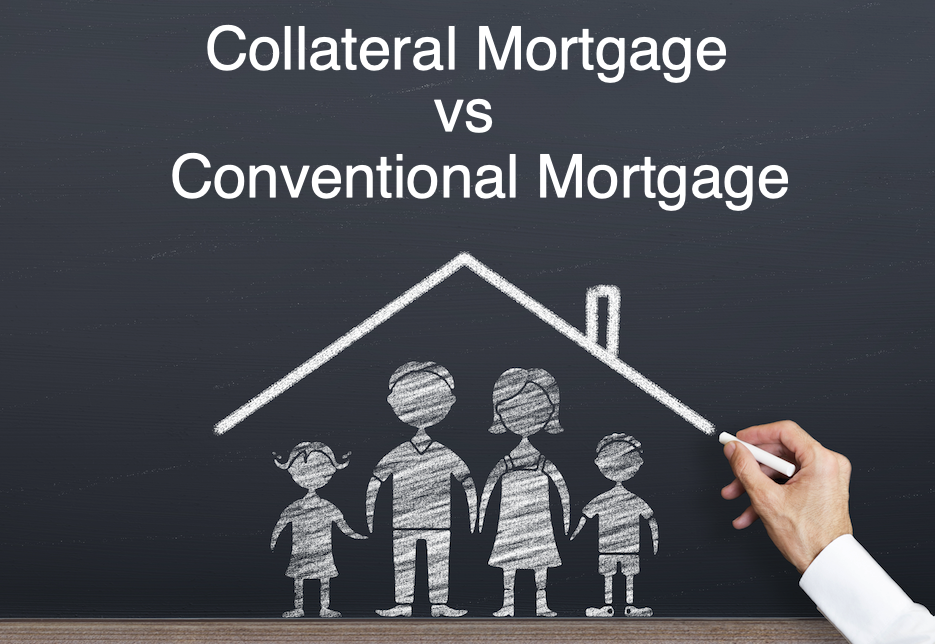What’s the Difference Between a Collateral Mortgage vs. a Conventional Mortgage?

What’s the Difference Between a Collateral Mortgage Vs. a Conventional Mortgage?
Getting the right mortgage when refinancing your mortgage or purchasing a home can be a confusing process. With so many different mortgage lenders and mortgage products out there, finding the mortgage that’s right for you and fits your financial needs. When getting a mortgage from a bank or AAA mortgage lender, there are two types of mortgages that you may encounter. A “collateral mortgage” also known as a “collateral charge mortgage”, and a “conventional mortgage” also known as a “traditional mortgage”. You might be wondering what’s the difference between these two types of different home loans and how would either of the two affect you.
What is a Conventional Mortgage?
A conventional mortgage is a mortgage loan where the borrower requires a loan of no more than 80% of the property’s appraised value, also known as the LTV or Loan To Value. In the case of a mortgage refinance the homeowner would have to keep at least 20% of the current property value mortgage-free and only refinance up to 80% of the value. In the case of a new purchase mortgage, the buyer will need to invest a minimum of 20% as a down payment to be able to potentially qualify for a conventional mortgage loan.
If for whatever reason you cannot afford a down payment of at least 20% of the appraised value of your home, then you would need to qualify for a high-ratio mortgage which mandates that you first qualify for mortgage default insurance which is typically provided by either CMHC insurance (Canadian Mortgage and Housing Corporation), Genworth Financial (which is now called Sagen), or Canada Guaranty.
In order to qualify for a high ratio insured mortgage, you would be required to have a good credit score of at least 680 in most cases, a good credit history, and strong provable income. This will allow you to borrow more than 80% of the value or your property as a mortgage loan (borrowed funds).
Since the risk to mortgage lenders of a borrower defaulting on their mortgage payment increases as the loan to value increases past 80%, the premium that the borrower must pay for the mortgage default insurance policy increases as the down payment amount decreases and gets closer and closer to the 5% down payment mark. This insurance policy will ensure that the mortgage lender will be paid by the insurance company whatever shortfall they may have in the event that you default on your mortgage payments and they need to proceed with a power of sale on your home.
Here is a simple table to help breakdown the cost structure of the CMHC insurance premium:
- 5% - 9.99% down payment: Premium = 4.00% of the loan amount
- 10% - 14.99% down payment: Premium = 3.10% of the loan amount
- 15% - 19.99% down payment: Premium = 2.80% of the loan amount
- 20% or more down payment: Premium = 0.00%
For example, if you have 5% available for a down payment towards the home purchase of a home selling for $400,000 then you would be putting down $20,000 as a down payment. This means that you would require a $380,000 mortgage loan for the home. In this case, if we use the information provided in the above chart to calculate the mortgage default insurance premium, you would be paying 4% on the total loan amount of $380,000. This comes out to $15,200 that you will pay for the mortgage default insurance policy.
What are the Pros of a Conventional Mortgage?
- One of the major benefits of qualifying for a conventional mortgage with a loan to value of no more than 80%, is that you will benefit by saving the extra costs of the mortgage default insurance premium. Since lenders do not require this type of insurance policy for conventional mortgage loans or more traditional mortgages, you will save thousands and even tens of thousands of dollars.
- Another very significant advantage of a conventional mortgage is that you will already own a good chunk of equity in your home. Depending on the percentage of down payment that you invest and how quickly the value of your property might increase, you might be able to qualify for a home equity loan, second mortgage, or a Home Equity Line of Credit (also known as a HELOC) immediately upon purchasing the property or shortly thereafter. This access to equity can come in handy in the event that you need to make any unexpected large purchases, it can be used as a home renovation loan, invested in other higher yielding investment vehicles, used towards the down payment on the purchase of a second home or rental property, or many other reasons.
- One more great benefit of making a larger down payment is that the bank or monoline lender would consider you to be a lower risk borrower and, in many cases, will extend preferred lower interest rates to you, and might even make certain exceptions when qualifying your income to debt ratio.
Cons of a Conventional Mortgage?
- The main downside to getting into a conventional mortgage is that you would have to put down more money towards the down payment and will be left with a smaller savings. This can be detrimental to the homeowner in the event that they need to access emergency funds for unexpected expenditures, although this can be addressed quickly with a home equity loan or second mortgage if absolutely necessary.
- Another detriment that can come with a conventional mortgage is that if the homeowner will need to draw on additional equity from their home in the future, even if they qualify for a HELOC or increased mortgage refinance with the same lender, they will have to incur additional fees such as legal fees and more.
What is a Collateral Mortgage?
- A collateral mortgage is a mortgage that can in some situations be re-advanceable to the borrower without requiring the homeowner to refinance. This can save the homeowner certain fees and costs associated with refinancing their mortgage. In order to be able to take advantage of this opportunity with a collateral charged mortgage, the homeowner would need to qualify for a home equity line of credit in the future, and the value of their home needs to increase over time.
- In the case of a collateral mortgage, the mortgage lender will register a charge on the property for a higher amount than the actual loan amount advanced to the borrower. By doing this, the lender automatically increases their security in the loan by forcing the borrower to turn to them if they ever require secondary financing using their home as collateral. Since the collateral charged mortgage will usually be registered at a higher loan to value than 80%, and in some cases registered up to 125% of the value of the property, your mortgage lender is effectively preventing you from seeking a second mortgage elsewhere unless the value of your property grows significantly. Fortunately private mortgage lenders are beginning to adapt and certain private lenders are now open to lending second mortgage loans behind of a collateral mortgage.
What are the Pros of a Collateral Mortgage?
- The primary benefit to taking out a collateral mortgage is that you will have not have to go through a full mortgage refinance application should you decide to refinance for a larger mortgage amount or take out a HELOC in the future. You would still need to ensure that your income, credit, and income-to-debt ratios qualify, and that the value of your property grows by that time.
- Another beneficial point is that if you do end up qualifying for the HELOC or increase in mortgage amount, then you would be saving fees that would normally be associated with this process, such as paying for a real estate lawyer, and so one.
What are the Cons of a Collateral Mortgage?
- Since the collateral mortgage essentially “over registers” your mortgage amount at a higher amount than you actually need as a mortgage, it might greatly limit your options when it comes to accessing additional equity from your home should you ever need to do so in the future. If the value of your property does not increase substantially enough and if you do not qualify for the increased loan amount with your current lender, then your options for secondary financing is greatly limited.
- Another detriment to a collateral charge mortgage would also be experienced in the event that you do not qualify for an equity loan through your current lender and are required to seek funding elsewhere. Even if you can find a private mortgage lender to accept granting you a second mortgage or home equity loan behind the collateral charged mortgage, the interest rate and lender fees that you will be required to pay them will likely be higher than were you to require a second mortgage loan behind a traditional conventional mortgage. This is because the second lender will be taking an increased risk since technically, were you to be able to qualify for a HELOC or increased mortgage refinance through your current lender in the future, that additional loan from your current lender will come in priority before the private lender’s second mortgage loan. This means that should you default on either mortgage and your property is put into a power of sale, the first mortgage lender can potentially take all or most of the proceeds from the power of sale to pay back their loans which can leave the private lender with a significant loss.
Is a Conventional Mortgage Better Than a Collateral Mortgages?
It’s not possible to make a general statement about which is better and more beneficial to the homeowner. The answer to that question really depends on the individual borrower’s situation and how the future plays out. If your income and credit remain strong while your debt load remains low, and the value of your home increases over time, and you qualify for an increased mortgage refinance with the same lender or home equity line of credit with that lender when the time comes, then a collateral mortgage would save you costs and fees in the future should you choose to tap into your home equity down the road.
If, however, you will not be able to qualify to take out additional equity with the same lender down the road if needed, then you will be at a disadvantage. In this case you will either need to find a private lender who will agree to go in second position behind a collateral charge mortgage which can end up costing you a lot of money in fees and interest, or you might be stuck and not able to find such a lender at the time.
Whatever your situation is, before signing a mortgage commitment, it’s important that you speak with a knowledgeable and experienced mortgage broker. The right mortgage agent can help you make the best decision for you based on your specific needs, goals, and financial situation, and can end up saving you thousands and even tens of thousands of dollars on mortgage refinancing costs in the future.





